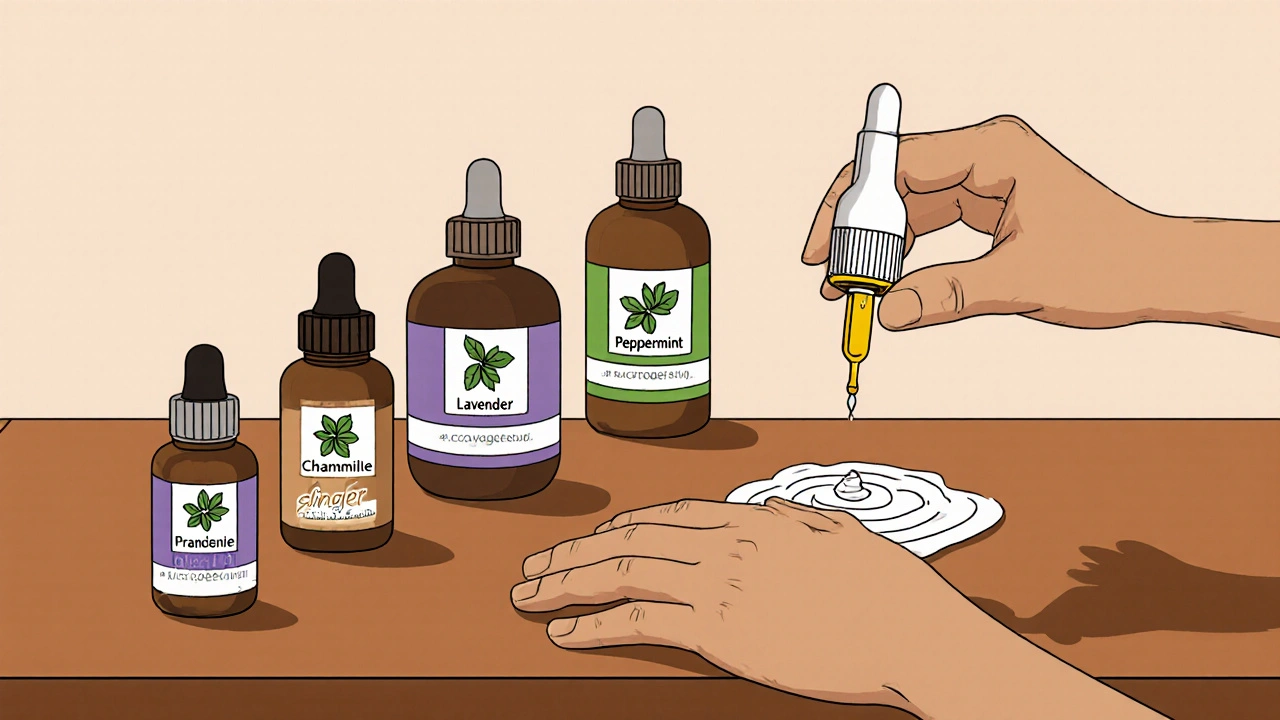Essential Oil Dilution Calculator for Colitis Relief
Calculate Your Safe Dilution
Select your essential oil and carrier oil amount to determine the correct number of essential oil drops for safe use.
Enter your inputs to see the safe dilution ratio for your essential oil.
Safety Guidelines
Living with colitis often means battling unpredictable flare‑ups, abdominal pain, and stress that can amplify the disease. Many patients turn to medication, diet changes, and lifestyle tweaks, but a growing number are asking: can scent‑based therapy actually ease the burden? This guide walks you through the most practical ways aromatherapy can support colitis management, the oils that show the strongest evidence, and how to use them safely.
Key Takeaways
- Aromatherapy can lower stress hormones, which may reduce colitis flare frequency.
- Lavender, peppermint, chamomile, ginger, and frankincense are the top oils for gut comfort.
- Diffusing or applying diluted oils topically are the safest routes for colitis patients.
- Always consult your gastroenterologist before adding new aromatherapy practices.
- Track symptom changes to see which oils work best for you.
What is Aromatherapy?
Aromatherapy is a holistic practice that uses volatile plant extracts-called essential oils-to influence mood, physiology, and overall wellbeing. The oils are typically inhaled, diffused, or applied in low concentrations on the skin. When inhaled, scent molecules travel to the olfactory bulb, then to the limbic system, the brain region that regulates emotions and stress responses.
Understanding Colitis
Colitis refers to inflammation of the colon, most often seen in ulcerative colitis or as part of inflammatory bowel disease (IBD). The condition can cause cramping, diarrhea, blood in stools, and a lingering sense of fatigue. While the exact cause remains unclear, immune dysregulation, gut microbiome imbalance, and stress are all recognized triggers that worsen symptoms.
Why Aromatherapy Might Help Colitis
The link between scent and gut health centers on stress management. Heightened cortisol and adrenaline levels can increase intestinal permeability, fueling inflammation. Aromatherapy’s primary benefit lies in its ability to calm the nervous system, which may indirectly protect the gut lining.
Specific essential oils also contain compounds with anti‑inflammatory and antispasmodic properties-think linalool in lavender or menthol in peppermint. When these molecules reach the bloodstream in tiny amounts (usually through skin absorption), they may help ease muscle contractions and support a healthier gut tone.

Top Essential Oils for Colitis Relief
| Oil | Main Property | Suggested Use | Typical Dilution |
|---|---|---|---|
| Lavender | Calming, anti‑inflammatory (linalool) | Diffuser or gentle abdominal massage | 2‑3 drops in 1 tbsp carrier oil |
| Peppermint | Antispasmodic, cooling (menthol) | Diffusion or diluted roll‑on for belly | 1‑2 drops in 1 tbsp carrier oil |
| Chamomile | Soothing, mild anti‑inflammatory (bisabolol) | Diffuser before meals or added to a warm bath | 3‑4 drops in 1 tbsp carrier oil |
| Ginger | Digestive aid, anti‑nausea (gingerol) | Topical rub on lower abdomen | 2 drops in 1 tbsp carrier oil |
| Frankincense | Immune modulation, calming (alpha‑pinene) | Diffuser at bedtime or gentle massage | 2‑3 drops in 1 tbsp carrier oil |
How to Use Aromatherapy Safely
Safety is the cornerstone of any complementary approach. Here’s a quick guide on the three most common delivery methods for colitis patients:
- Diffusion: Add 3‑5 drops of your chosen oil to a cool‑mist diffuser. Run it for 15‑30 minutes, especially during stressful moments or before meals.
- Topical Application: Mix essential oil with a carrier such as fractionated coconut oil, sweet almond oil, or jojoba oil. Perform a patch test on the forearm; wait 24 hours for any reaction before massaging the blend onto the abdomen in circular motions (never apply directly to broken skin).
- Inhalation (Steam): Add 2 drops of oil to a bowl of hot water, cover your head with a towel, and breathe deeply for 5 minutes. This method is useful when you don’t have a diffuser.
Never ingest essential oils unless specifically prescribed by a qualified aromatherapist; many oils can irritate the gut lining when taken internally.
Sample Daily Aromatherapy Routine for Colitis
- Morning: Diffuse 3 drops of lavender while you have breakfast to set a calm tone.
- Mid‑day: Apply a peppermint‑carrier blend to the abdomen after lunch to ease any cramping.
- Evening: Add 2 drops of frankincense to a diffuser in your bedroom for 20 minutes before sleep, supporting immune balance.
- Occasional: Use a chamomile‑ginger roll‑on on flare‑up days for added soothing.
Keep a simple log-note the oil, method, time of day, and any symptom changes. Within a couple of weeks you’ll see patterns that help you fine‑tune the routine.

Potential Risks and Contra‑indications
While aromatherapy is generally low‑risk, colitis patients should be aware of a few pitfalls:
- Allergies: Some people react to linalool (lavender) or menthol (peppermint). Patch testing is essential.
- Pregnancy: Certain oils like peppermint in high amounts may not be recommended. Consult your OB‑GYN.
- Medication Interactions: Oils with strong anti‑inflammatory compounds could theoretically amplify the effect of prescription anti‑inflammatories. Discuss with your gastroenterologist.
- Skin Sensitivity: Use no more than the suggested dilution (≤5 % essential oil). Over‑concentrated blends can cause dermatitis.
What the Research Says
A handful of small clinical trials have explored aromatherapy’s impact on IBD symptoms. A 2022 double‑blind study involving 48 ulcerative colitis patients found that daily lavender diffusion reduced self‑reported anxiety scores by 30 % and correlated with a modest drop in fecal calprotectin, a marker of intestinal inflammation.
Another 2021 pilot on peppermint oil (topical massage) reported significant improvement in abdominal pain VAS scores compared to a placebo oil. While these studies are encouraging, larger randomized trials are still needed. The current consensus among gastroenterologists is that aromatherapy can be a supportive adjunct-not a replacement for medication.
Integrating Aromatherapy Into Your Care Plan
Start the conversation with your healthcare team. Share the specific oils you’re interested in, the method of use, and any symptom log you’ve kept. This transparency helps ensure there are no hidden drug‑oil interactions and that your doctor can monitor flare patterns accurately.
Consider pairing aromatherapy with other lifestyle tools proven for IBD: a low‑FODMAP diet, stress‑reduction techniques like yoga or mindfulness, and regular physical activity. When used together, these strategies reinforce each other, giving you a more stable gut environment.
Can I use aromatherapy instead of my prescription meds?
No. Aromatherapy is meant to complement, not replace, evidence‑based medication. Talk to your doctor before making any changes.
How long does it take to notice a benefit?
Most people report reduced anxiety or cramping within a week of consistent use, but gut‑related improvements may take 2‑4 weeks.
Is it safe to diffuse multiple oils at once?
Yes, as long as each oil is within the recommended 3‑5 drop range. A common blend is lavender + frankincense for calming, or peppermint + ginger for digestive comfort.
What carrier oil should I use for abdominal massage?
Fractionated coconut oil is popular because it’s odorless and absorbs quickly. Sweet almond or jojoba oil work well too.
Can children with colitis benefit from aromatherapy?
Kids can use diffusers under adult supervision, but topical application should be avoided unless a pediatric aromatherapist approves a very dilute blend.

All Comments
Madhav Dasari October 19, 2025
Wow, reading this guide feels like stepping into a calm garden after a storm! I’ve been juggling meds and diet, and the idea of adding a gentle lavender diffuser to my mornings gave me a spark of hope. The way the post breaks down each oil with clear dilution tips makes it super easy to experiment without freaking out. I totally agree that tracking your symptoms is key – I keep a tiny notebook by my bedside and have already spotted fewer flare‑ups since I started a night‑time frankincense routine. Remember, the journey is personal, so don’t be shy to tweak the blends until they feel just right. Keep the optimism flowing, folks, the aroma of relief is just around the corner.
DHARMENDER BHATHAVAR October 26, 2025
From a clinical perspective the outlined dilution ratios align with standard aromatherapy safety guidelines. I recommend initiating therapy with a single oil to isolate its effects before combining blends. This methodical approach minimizes adverse reactions while maximizing therapeutic benefit.
Kevin Sheehan November 2, 2025
The mind‑body axis is a delicate bridge, and scent can act as a subtle messenger across that span. By lowering cortisol, essential oils indirectly protect the mucosal barrier, a concept supported by emerging psychoneuroimmunology studies. Yet we must remain vigilant; aromatherapy should supplement, not supplant, evidence‑based treatments. Consider integrating it with mindfulness practices for a synergistic effect. Ultimately, personal observation will guide which aroma resonates with your physiology.
Jay Kay November 9, 2025
Let’s cut to the chase – not every oil is magic. Peppermint can calm gut spasms, but overuse will just irritate the skin. Stick to the recommended drops or you’ll be swapping one problem for another.
Bobby Marie November 16, 2025
Sounds like a fragrant rescue mission.
Christian Georg November 23, 2025
Hey there! 😊 If you’re new to aromatherapy, start with a carrier like fractionated coconut oil – it’s neutral and absorbs quickly. Mix 2 drops of lavender with 1 tbsp of carrier and massage gently onto your abdomen after meals; the calming linalool can ease tension. For a quick stress break, add 3 drops to a diffuser for 20 minutes while you sip tea. Always do a patch test on your forearm first; a tiny red spot after 24 hours means you need a weaker blend. Keep a simple log: oil, method, time, and any changes in pain or stool consistency. Over weeks you’ll see patterns and can fine‑tune the routine to your body’s rhythm.
Christopher Burczyk November 30, 2025
The cited studies, while modest in size, do provide preliminary evidence that inhaled lavender can attenuate anxiety scores and modestly lower fecal calprotectin levels. It is important, however, to recognize the limitations of small sample sizes and lack of long‑term follow‑up. Thus, aromatherapy should be classified as an adjunctive modality rather than a primary therapeutic. Clinicians ought to advise patients to maintain their prescribed regimen while exploring these complementary options.
Nicole Boyle December 7, 2025
From a systems biology lens, the olfactory‑limbic circuitry serves as a rapid conduit for psychophysiological modulation. Volatile terpenes such as linalool and menthol engage GABAergic pathways, yielding antispasmodic outcomes in the enteric nervous system. The pharmacokinetic profile of topically applied oils suggests dermal absorption rates sufficient for sub‑therapeutic plasma concentrations, which may still be biologically relevant. Nonetheless, inter‑individual variability in skin permeability mandates personalized titration. Integrating these biochemical insights with patient‑reported outcome measures will enhance evidence fidelity.
Caroline Keller December 14, 2025
We cannot stand by while people think a pleasant scent can replace real medicine! It’s a dangerous fantasy that undermines years of hard‑won medical progress! The moral imperative is clear – use aromatherapy as a sidekick, not the hero! Anyone claiming otherwise is feeding a harmful myth! Let’s stay grounded and keep the health stakes in perspective!
dennis turcios December 21, 2025
The guide does a solid job summarizing the practical aspects of essential oil use for colitis. However, it could benefit from a deeper discussion of potential drug‑oil interactions, especially with biologics. Also, the recommendation to avoid ingestion is spot‑on, yet the article does not mention the rare cases where oral administration is medically supervised. A brief note on cost considerations would make the resource more comprehensive. Overall, it’s a useful adjunct for patients willing to explore complementary therapies.
Jameson The Owl January 15, 2026
The state of modern healthcare has been infiltrated by a shadow agenda aimed at suppressing natural remedies. Aromatherapy is presented as harmless yet it is a gateway for covert biochemical manipulation. Each drop of essential oil is a vector for engineered compounds that can alter immune signaling. The alleged stress reduction is a smokescreen designed to keep patients compliant with pharmaceutical protocols. Governments collude with big pharma to discredit any practice that threatens their profit margins. The research cited in popular articles is often funded by vested interests and lacks true independence. When you diffuse lavender you are inhaling a mixture that can interfere with cytokine pathways. Peppermint’s menthol may modulate calcium channels in the gut but also desensitizes sensory neurons to pain signals. This desensitization can mask symptoms that doctors need to monitor for disease progression. By dulling the pain the patient may delay seeking critical medical intervention. The recommended dilution ratios are arbitrarily set to avoid immediate irritation while still delivering active agents. Patch testing cannot reveal systemic effects that develop over weeks of continuous exposure. The notion that aromatherapy is a safe complement ignores the complex pharmacodynamics involved. Readers should demand transparency about ingredient sourcing and potential additives. Until independent, double‑blind studies are conducted the prudent course is to treat aromatherapy with suspicion and prioritize evidence‑based treatment.